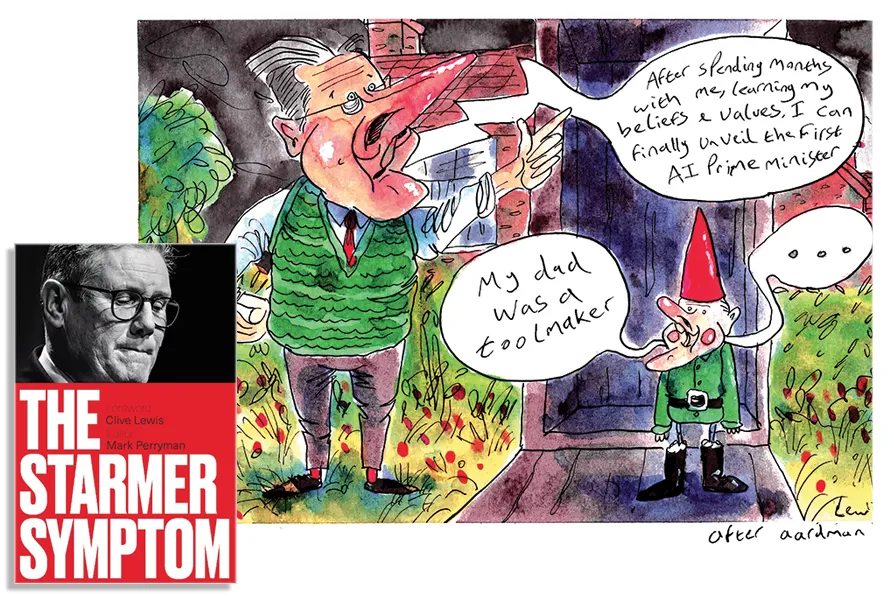The Bard stands with the Reformers of Peterloo, and their shared genius in teaching history with music and song
ANDREW MURRAY recommends a volume of essays that nail the visionless, racist and neoliberal character of policy under Starmer’s Labour Party

 Cartoon by Lewis
Cartoon by Lewis
The Starmer Symptom
Edited by Mark Perryman, Pluto, £16.99
NOT a phenomenon. Not an era. Surely not an -ism. Simply a symptom.
But what is the Prime Minister a symptom of? Mark Perryman takes his inspiration from the famous Gramsci quote regarding what we have to endure while the old is dying but the new cannot be born.
Therefore, the symptom is morbid and that seems about right. The essays in this collection go some way to explaining why.
They outline how Starmer’s morbidity — trying to manage a system deep in a trough of unmanageability — is becoming Britain’s, as his government seems to be achieving little beyond opening the door to the right-wing populism of Farage, a populism it seeks to defeat without actually challenging. It is a morbid manoeuvre that is unlikely to end well.
Perryman has long specialised in intellectual challenges. He has previously probed the entrails of Corbynism and, what now seems an age ago, was probably the most stimulating thinker associated with the Eurocommunist wing of the old CPGB.
He goes where other thinkers on the left often don’t bother to tread, and is a standing rebuke to the under-theorisation of political experience and obsessive pragmatism which have been among the British labour movement’s least valuable contributions to international socialism.
Perryman’s own essay is the most interesting here. He is scathing about Starmer’s dismissal of the rich traditions of protest embedded in the British left, traditions his government presently seems intent on extirpating to the greatest extent possible.
Picking at the Gramscian thread, he also scores Starmer’s lack — indeed, wilful rejection of — anything approximating to a hegemonic project. This, as much as anything, exposes the fatuity of Starmer’s single-word slogan of “change,” a pitch to the electorate which meant nothing more than a new administrative broom.
In contrast to Thatcher, who upended political assumptions in her time, “there is the failure of Blair and Starmer to replace the fundamentals of Thatcherism, or what it evolved into globally, neoliberalism”, he writes.
Starmer and his Chancellor Rachel Reeves have made it abundantly clear that they will stick within those tram lines, notwithstanding that the promise of neoliberalism, whatever it may exactly have been, was punctured as long ago as 2008.
Since then the British economy, British society and the British state have been in a state of entropic decay, with problems accumulating unresolved by the year. Starmer was last year’s solution for a beleaguered Establishment, Farage may be next’s.
Perryman nevertheless strives to be optimistic, invoking the possibility of a different Labour Party “that fosters a culture that is organically intellectual,” that is plural and convivial and “that is unafraid to act, to campaign and to govern as the leading party of a much broader progressive bloc.”
I fear that moment might be past. Corbynism was at least an approximate approach to such a thing, and it was rejected as much by the Labour Party itself — its MPs, its apparatus, its entrenched local bailiwicks and at least some affiliated unions — as by anything else.
Perryman calls this “testing the limits of Labourism to destruction.” I feel we may be already looking at Labourism, its culture, its assumptions and its roots in the rear view mirror.
It will certainly be interesting to see what Perryman makes of the new party of the left, if it prospers sufficiently to be worthy of a comparable volume.
Inevitably, the other essays are of varying quality and interest. Yasmin Alibhai-Brown’s contribution is splendid, a cry of rage at Labour’s historic approach to racism, a record saturated with chauvinism and pandering to prejudice. It is a reminder that Starmer’s “island of strangers” rhetoric was not an aberration.
Jeremy Gilbert puts his finger on a core weakness of Starmer too — that it is founded on fraud. That the Prime Minister “deceived and tricked his way into leading Labour in an entirely different direction from that endorsed by most of its members, and a large section of the voting public” should never be forgotten.
Some essays drift too far from Perryman’s Marxist framing or, sometimes, any useful framing at all. Jess Garland of the Electoral Reform Society makes the very strong case for a shift to proportional representation in much the same way as would be made in any other context, without really examining why Starmer is so set against such a change, which is in fact Labour Party policy.
He is, I would argue, above all a state functionary, committed to its procedures and prerogatives, and much happier cracking down on last summer’s racist disorders, for example, than confronting racism in any meaningful way.
Likewise, he has sought to beset the Palestine solidarity movement more than Sunak’s government ever did, although the movement has the weight of public opinion on its side. This could perhaps have been explored more.
But in all, we are once again indebted to Perryman. Others will hopefully develop further answers to the questions he raises in this often stimulating volume.

CLAUDIA WEBBE argues that Labour gains nothing from its adoption of right-wing stances on immigration, and seems instead to be deliberately paving the way for the far right to become an established force in British politics, as it has already in Europe

The Tories’ trouble is rooted in the British capitalist Establishment now being more disoriented and uncertain of its social mission than before, argues ANDREW MURRAY

Reform’s rise speaks to a deep crisis in Establishment parties – but relies on appealing to social and economic grievances the left should make its own, argues NICK WRIGHT











